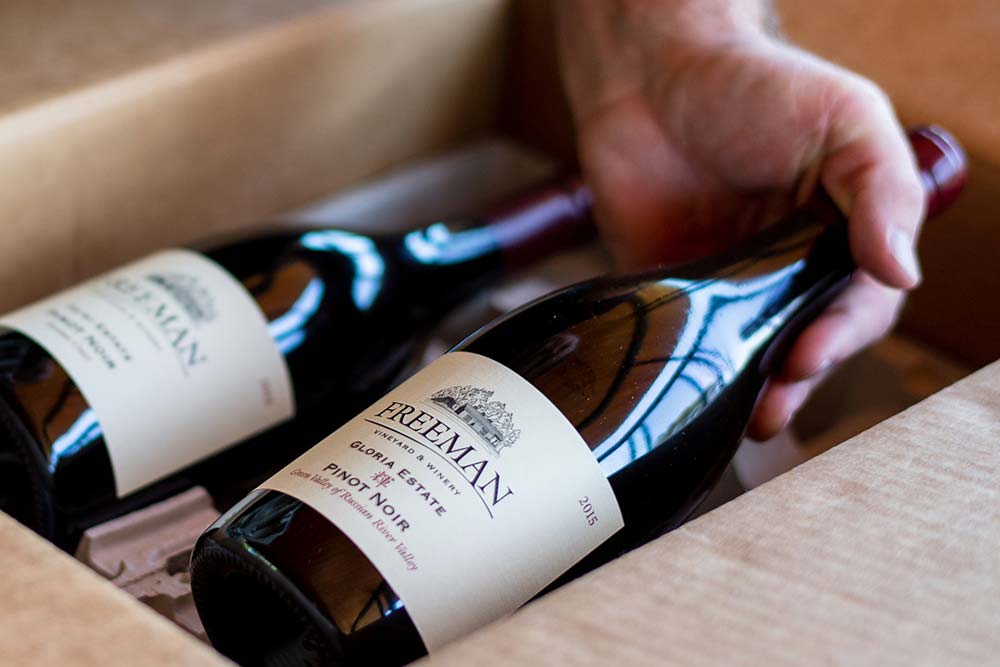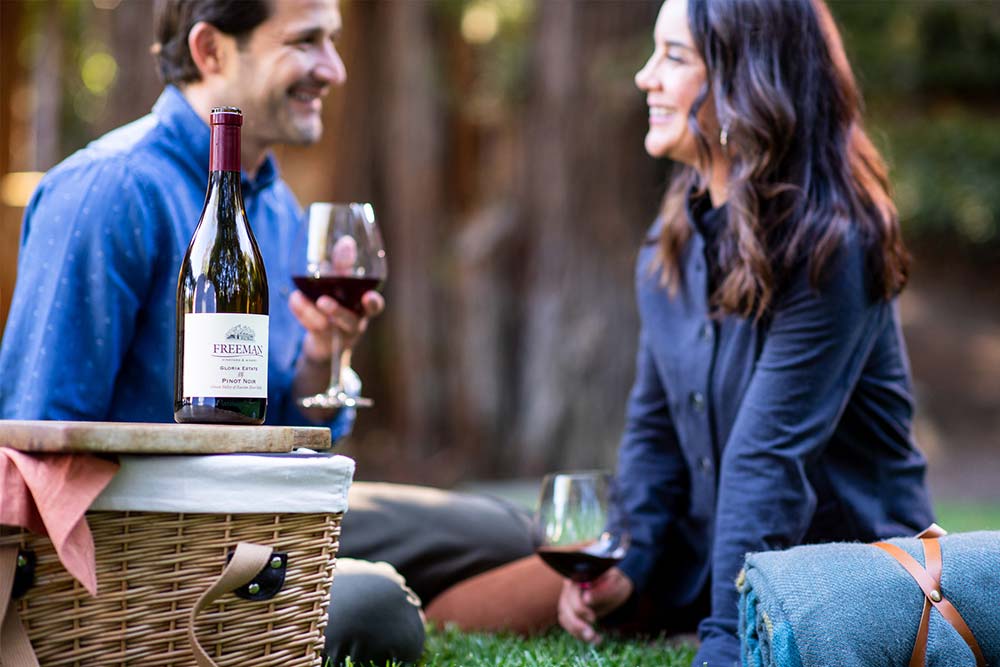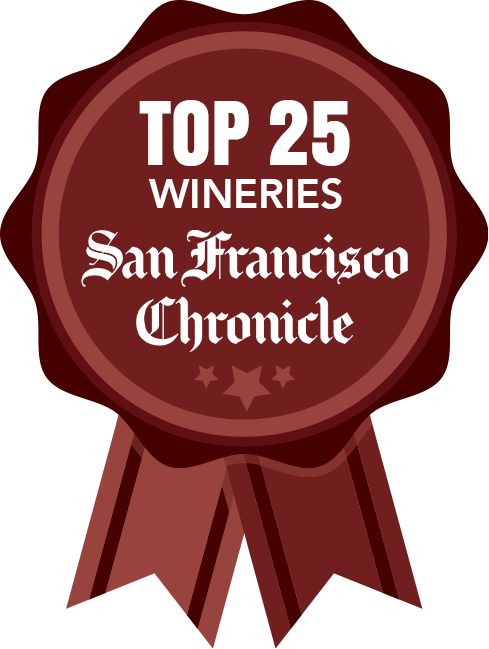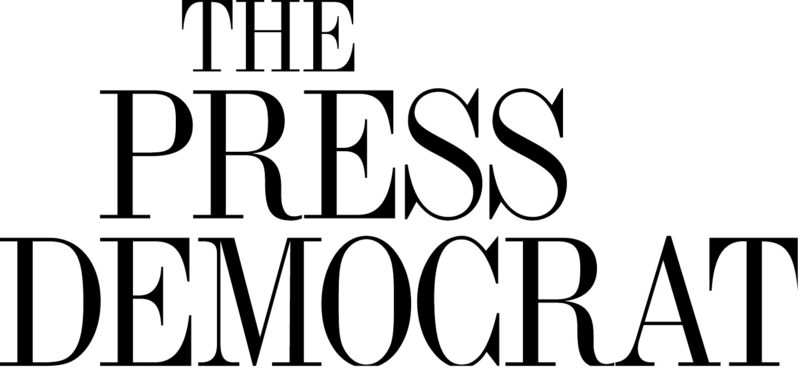
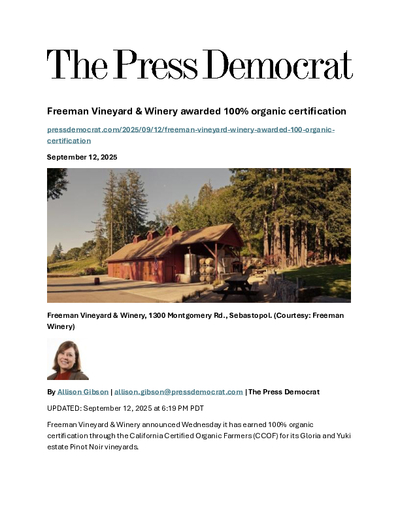
|
Press Democrat
Freeman Vineyard & Winery Earns 100% Organic Certification
The Press Democrat reports that Freeman Vineyard & Winery has achieved 100% organic certification through California Certified Organic Farmers (CCOF) for its Gloria and Yu-Ki estate Pinot Noir vineyards. Founders Akiko and Ken Freeman mark this milestone alongside new sustainable packaging initiatives—introducing lighter-weight glass bottles and removing tin capsules to further reduce the winery’s carbon footprint. |
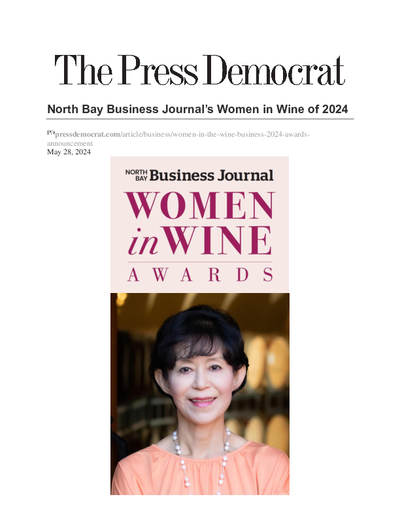
|
Press Democrat
North Bay Business Journal’s Women in Wine of 2024 - Excellence in Winemaking Award: Akiko Freeman
North Bay Business Journal’s annual Women in Wine Awards celebrate the achievements and contributions of female winemakers and wine industry professionals in the North Bay. This is the second year for this event with nominations in categories that include: Impactful Leader, Rising Star, and Excellence in Sustainability. "I am honored to celebrate the extraordinary contributions of women in the wine industry through our Women in Wine Awards 2024,“ said Lorez Bailey, North Bay Business Journal publisher. ” This event not only highlights their remarkable achievements but also inspires the next generation of female leaders in wine. We are thrilled to host this prestigious event at the historic MacMurray Ranch, providing a beautiful backdrop to honor these exceptional women who have made indelible marks on the wine world.” Award winners were selected by a panel of judges and assessed by their excellence in wine growing achievements, leadership, and career impact. They will be honored at a networking and awards event June 6 at MacMurray Ranch in Healdsburg. Inspirational Leader Award: Honoring a trailblazing woman within the wine industry who not only excels in her role but also serves as a source of motivation and empowerment to others. – Rachel Ashley, senior vice president of supply, Treasury Wine Estates – Anisya Thomas Fritz, proprietor, Lynmar Estate Winery – Leslie Frank, co-founder, Frank Family Vineyards Excellence in Winemaking Award: Recognizing a female winemaker who has demonstrated exceptional skills, innovation, and consistency in producing high-quality wines. – Jessica Koga, winemaker, Schramsberg Vineyards – Maggie Kruse, head winemaker, Jordan Vineyard & Winery – Akiko Freeman, co-owner and winemaker, Freeman Vineyard & Winery Rising Star Award: Awarding a promising newcomer who has already shown remarkable potential and early accomplishments in any area of the wine industry. – Melissa Smith, owner, Enotrias Excellence in Sustainability Award: Recognizing a woman who has made significant strides in promoting and implementing sustainable and environmentally responsible practices within the wine industry. – Sarah Wuethrich, winemaker, Maggy Hawk and WindRacer – Chris Kajani, president and winemaker, Bouchaine Vineyards Trailblazer Award: Celebrating a woman’s pioneering spirit, groundbreaking contributions, and forward-thinking innovations that have pushed the boundaries of winemaking, viticulture, or the wine business. It honors the role of a visionary driving positive change and setting new standards within the wine world. – Philana Bouvier, president, Demeine Estates – MJ Dale, CEO, Customer Vineyard Impactful Leader Award: Recognizing a woman who has significantly influenced and positively transformed her field. Through her actions, innovations, and dedication, she has left a lasting mark on the industry and inspired others to drive meaningful change. – Lauren Wong, vice president of sales and marketing, Aperture Cellars – Jessica Limon, senior manager of trade and consumer hospitality, E. & J. Gallo Winery – Violet Grgich, president and CEO, Grgich Hills Estate Winery Heart of the Community Award: Celebrating a woman who has made significant contributions to her local wine community through advocacy, events, and outreach. – Drea Helfer, president, DH Wine Compliance – Linda Mayberry-Chavez, CEO, Chavez Family Cellars Excellence in Winegrowing Award: Recognizing those who demonstrate exceptional skill, innovation, and dedication in wine growing, celebrating their expertise and commitment to cultivating the finest quality grapes. – Karin Warnelius-Miller, proprietor, winegrape grower and winemaker, Garden Creek Ranch Vineyards & Winery Legacy Award: This distinguished award honors a woman whose enduring contributions and lifelong dedication to the wine industry have left an indelible legacy. Through her leadership, vision, and unwavering commitment, she has shaped the industry's future, paving the way for future generations of women in wine. – Kimberlee Nicholls, winemaker, Markham Vineyards – Linda Trotta, vice president for global winemaking and sourcing at WX Brands, winemaker at Bread & Butter Wines To purchase tickets: Get tickets here. |
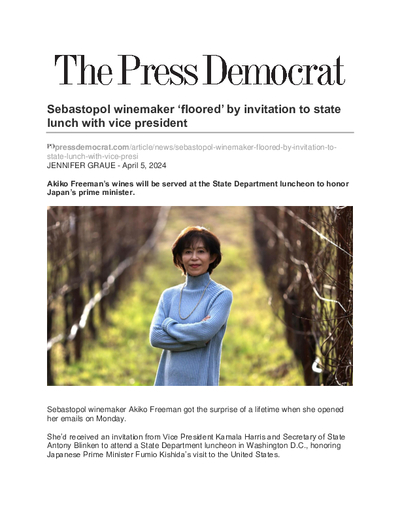
|
Press Democrat
Sebastopol winemaker ‘floored’ by invitation to state lunch with vice president
Akiko Freeman’s wines will be served at the State Department luncheon to honor Japan’s prime minister. Sebastopol winemaker Akiko Freeman got the surprise of a lifetime when she opened her emails on Monday. She’d received an invitation from Vice President Kamala Harris and Secretary of State Antony Blinken to attend a State Department luncheon in Washington D.C., honoring Japanese Prime Minister Fumio Kishida’s visit to the United States. “I’m just so humbled and excited and very honored,” said Freeman when reached by phone Thursday after the winery shared the news in an Instagram post. “It’s so rewarding.” Freeman and her husband, Ken, will fly to Washington next Wednesday to attend the April 11 event, where three of their wines will also be served. The State Department contacted Freeman Winery in Sebastopol a few weeks ago and asked them to send various kinds so they could choose some to serve at the lunch. A trio of wines were selected and Freeman shipped three cases of each, figuring that would be it. Her wine had previously been served at a White House State Dinner in 2015 when President Barack Obama hosted Japan’s then-Prime Minister Shinzo Abe, but that honor didn’t come with a dinner invitation. “We thought this would be the same, so I didn’t expect that. It’s so amazing,” she said. Freeman’s husband, Ken, said he was “floored” when his wife told him the news. “She had a big smile on her face. She knew how exciting this was,” he said. The three Freeman wines to be served at the luncheon include a sparkling wine, the 2020 Yu-Ki Estate Blanc de Blancs, a 2021 Ryo-Fu Chardonnay and a 2021 Akiko’s Cuvée Pinot Noir. A winemaker having their wines served to a roomful of world dignitaries is already a huge honor. Being there in person, though, is the icing on the cake. “I can witness if people are enjoying the wine, that’s all that matters to me,” said Akiko Freeman. “If people love it, it’s rewarding and makes me keep doing what I like.” She added she is particularly fond of the sparkling wine because the vintage, 2020, was a year when she lost a lot of fruit to wildfire smoke. “It’s one of the very few wines we were able to produce without compromise,” she said. Her husband, in the true spirit of the State Department, quite diplomatically chose the pinot noir, “the one with my wife’s name on it,” as the one he’s most looking forward to seeing served at the lunch. Akiko Freeman said that wine is a blend of her favorite barrels from the 2021 harvest. “This is not a vineyard designate,” she explained. “We picked the best tasting barrels of the year, it’s just full of goodness.” An earlier vintage of the chardonnay was served at the 2015 state dinner. State Department luncheons are typically hosted the day after a White House State Dinner, which is a formal event. The dress code on the Freeman’s invitation states “business attire.” That’s quite a bit different than what Akiko Freeman wears on a typical workday doing punchdowns, crawling in tanks and shoveling pomace, the solids left behind after pressing juice from grapes. “She’s in T-shirt, jeans and work boots during the work week,” said Ken Freeman. Nevertheless, the Freemans are looking forward to spiffing up and meeting the Japanese Prime Minister Fumio Kishida, and his wife, Yuko. Akiko Freeman, who last year received an award from Japan for her contributions to the agricultural industry, said she was supposed to meet the prime minister’s wife when they were in San Francisco for the APEC summit last autumn, but her trip was canceled. And of course being in the same room with Blinken and Harris is pretty thrilling, too. “I just want to thank her for her service,” Akiko Freeman said of the vice president. “She’s from the Bay Area, and meeting the (first) female vice president is very exciting to me.” Like the vice president’s husband, Doug Emhoff, Ken Freeman is proud of his wife’s achievements and is undoubtedly her biggest cheerleader. “She had never wanted to speak to the media or promote herself,” he said. “Akiko is so humble. It’s really great to see her getting some recognition, so that’s why I’m really excited and proud about this,” You can reach Staff Writer Jennifer Graue at 707-521-5262 or jennifer.graue@pressdemocrat.com. On X (Twitter) @JenInOz. |
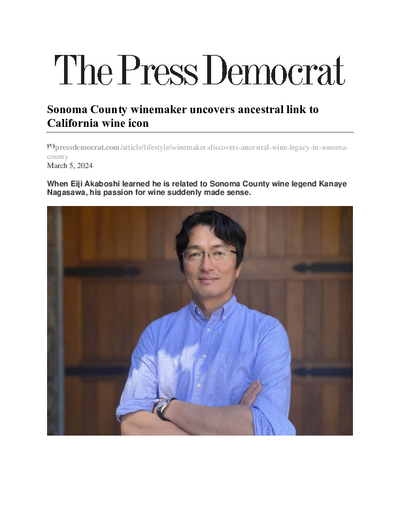
|
Press Democrat
Sonoma County winemaker uncovers ancestral link to California wine icon
One of Eiji Akaboshi’s earliest memories is his discovery of the world through sensory exploration. Born in Brazil to Japanese parents, Akaboshi was just 3 years old when his family moved to Chile, where he spent much of his childhood playing outdoors. That’s where he discovered his keen sense of smell and fascination with textures. “Kids experience the world in different ways, and for me, it was always through my senses,” said Akaboshi, associate winemaker at Freeman Winery in the Russian River Valley. “That helped me develop an early appreciation for flavors and scents that I still have today.” As a winemaker, Akaboshi’s heightened senses have served him well, especially at Freeman where he and fellow Japanese winemaker Akiko Freeman produce elegant pinot noirs and chardonnays. Working alongside a fellow Japanese winemaker wasn’t something Akaboshi set out to do. But that’s just one of the serendipitous things that have transpired during his lifetime. A family legacy Growing up in Chile, Akaboshi remembers his father developing an affinity for Chilean wine — bold cabernet sauvignon, carmenère, sauvignon blanc, chardonnay — which became frequent guests at the dinner table. “My father has always loved wine. Even though I was very young when we lived in Chile, wine is something that stuck in my mind,” said Akaboshi. “By the time I got to college, I was the kid with the wine glass drinking Chianti in the dorm.” Majoring in biology at the University of Hawaii, Akaboshi found the research lab unfulfilling. By the time he reached his last year of undergrad, he still didn’t know what to pursue as a career. “But one day, I had this eureka moment when I realized winemaking is a biological process,” said Akaboshi. “So I decided to link my college degree with my wine-drinking hobby and become a winemaker.” While pursuing his master’s degree in enology from Fresno State, Akaboshi recalls his father casually mentioning they had a relative who used to make wine “a long time ago.” “I think he gave me Kanaye Nagasawa’s name, but he mentioned it in passing so I just sort of forgot about it,” said Akaboshi. “It wasn’t until later when I looked up Nagasawa’s name that I realized I wasn’t the first person in our family to make wine in California. Nagasawa had beaten me by 120 years.” Born in 1852 in Kagoshima, Japan, Kanaye Nagasawa was one of 15 young students smuggled out of Shogunate Period Japan on a reconnaissance mission to study Western culture in the United Kingdom. Tens of thousands of ballots still be be counted in Sonoma and Napa counties MARTIN ESPINOZA THE PRESS DEMOCRAT At age 13, Nagasawa was too young to attend university, so he was sent to Scotland where his path eventually crossed with religious leader Thomas Lake Harris. Harris recruited Nagasawa to work at his commune in New York, and when Harris decided to relocate the community to Sonoma County, Nagasawa followed. In 1875, Harris purchased 400 acres in the Fountaingrove area of Santa Rosa (for just $50 an acre), where he went on to launch Fountaingrove Winery in 1882. When Harris left California in 1892, he put Nagasawa in charge of the entire estate, including the ranch, winery, vineyards, manor house and Santa Rosa’s iconic Round Barn, which used to house 60 horses. Under Nagasawa’s steady leadership, Fountaingrove Winery grew to become one of California’s 10 largest wineries at that time. That earned him significant respect, both in the U.S. and abroad, where he was known as the “Wine King of California.” Today, Nagasawa is considered a significant figure in California wine history. Not only was he the first to market California wines in Europe, he presided over one of Sonoma County’s most prominent wineries of his era. After his death in 1934, Fountaingrove Winery was seized by the government as part of California’s Alien Land Laws, which forbid Asians from owning land or businesses. The property was eventually sold and turned into ranch land. “I was shocked when I learned Nagasawa’s story," said Akoboshi, Nagasawa’s great, great grandnephew. “That was really a profound moment for me.” A coincidental connection Akaboshi never planned to work for one of the few Japanese winemakers in California, but it’s “a happy coincidence” that makes him know he’s in the right place, he said. “About 10 years ago, I tasted Akiko’s wines at a gathering and was so impressed. I didn’t know California could produce pinot noirs with such elegance,” said Akaboshi. “I get goose bumps just thinking about it. I thought, wow, it would be wonderful to work with Akiko someday. But it was only a wish at the time.” But last February, Freeman Winery announced they were looking for an associate winemaker. Akaboshi, it turned out, was perfect for the job. “I was so excited, I could hardly believe it when they hired me,” said Akaboshi. “I felt like I really connected with Akiko, so I must have made a strong impression.” “When Eiji and I started talking about working together at the winery, everything just felt right,” said Akiko Freeman, who founded Freeman Winery with her husband, Ken Freeman, in 2001. “I’d been following his winemaking career and knew he would make a strong associate winemaker.” Their collaboration has been an interesting and special experience for Akaboshi, who said he never expected to have an opportunity to speak Japanese in the cellar. “I’m not sure if it’s because we’re both Japanese, but Akiko and I have very similar palates and prefer lighter, Burgundy-style pinot noirs,” said Akaboshi. “But one thing I will say, is that she has an amazing work ethic, which is very Japanese. I’ll come to work early in the morning and she’ll be sweeping the floors.” But the connection Akaboshi shares with Freeman encompasses much more than a working style or philosophy. As it turns out, his great-grandfather Akaboshi Tetsuma used to do business with Freeman’s grandfather in Japan. “When Eiji and I discovered our ancestors back in Japan were good friends in the early 1900s it was quite a coincidence,” said Freeman. ”We both feel that us getting together is more about destiny than just luck.” For Akaboshi, following in the footsteps of Nagasawa while working at Freeman Winery is “a dream come true.” “It’s one of those rare instances in life where I know this is exactly where I want to be,” said Akaboshi. “That’s a wonderful feeling.” You can reach Staff Writer Sarah Doyle at 707-521-5478 or sarah.doyle@pressdemocrat.com. Follow Sarah on Instagram at @whiskymuse.
|
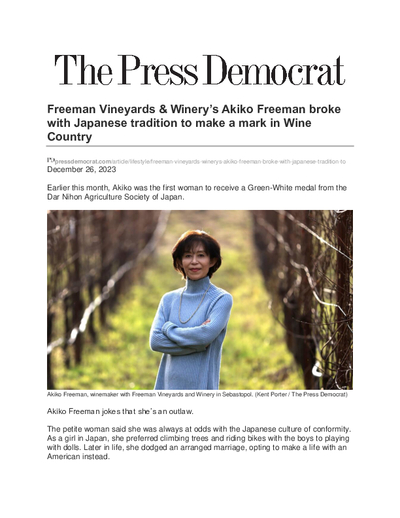
|
Press Democrat
Freeman Vineyards & Winery’s Akiko Freeman broke with Japanese tradition to make a mark in Wine Country
Earlier this month, Akiko was the first woman to receive a Green-White medal from the Dar Nihon Agriculture Society of Japan Akiko Freeman jokes that she’s an outlaw. The petite woman said she was always at odds with the Japanese culture of conformity. As a girl in Japan, she preferred climbing trees and riding bikes with the boys to playing with dolls. Later in life, she dodged an arranged marriage, opting to make a life with an American instead. In 1995, she married entrepreneur Ken Freeman, who had his sights on becoming a vintner. The duo founded their namesake winery — Freeman Vineyards & Winery — in Sebastopol in 2001. Akiko became the boots-on-the-ground winemaker in 2010 for the Freeman brand after apprenticing with winemaker Ed Kurtzman. By 2015, the Freemans saw their chardonnay served at the White House, at a state dinner for Prime Minister Shinzo Abe. Today the vintners’ label is one of the leading brands in Japan. Earlier this month, Akiko was the first woman to receive a Green-White medal from the Dar Nihon Agriculture Society of Japan. The Japanese government organization awards the Green-White medal to honor individuals who make an exceptional contribution to the agricultural industry. The criteria for American nominees is also that they foster goodwill between the United States and Japan. Generosity has long been a cornerstone of Freeman Vineyards, with the winery giving 5% of its wine club sales to charities, including the Asia Society, the Asian Cultural Council and the Japan Society. At a ceremony in Los Angeles, the organization lauded Akiko for her contribution to goodwill between the countries, her reputable label and her long-term vision for organic farming. “I’m glad people recognize me for what I’m doing,” Akiko said. “The wine world is so very male-dominated. And I hope because I got this award, it’s going to open the door and be an inspiration for young female winemakers. Like, if they hope to reach for a star, it can be done.” An unlikely marriage Akiko’s grandfather Yoshitaro Wakimura told her she and her parents would be written out of his will if she married “the foreigner.” To protect her parents, Akiko returned Ken’s engagement ring twice. But Ken was persistent. In 1995, he was working in Hong Kong, setting up networks across Asia for the Discovery Channel. He told Akiko, who was in Tokyo, “I’m coming for you.” As a somewhat isolated country, Japan wasn’t used to having foreigners intermarry, especially in the upper levels of society, Ken said. Akiko is a cousin of the former Empress Michiko. When Akiko told her mother Ken was on his way, she trusted the marriage was meant to be and encouraged her daughter to go with him. “I don’t know what magic my mother had, but somehow she made my grandfather understand that I needed to do this,” Akiko said. “And so it all worked out.” If she had followed Japanese tradition, Akiko said, she would have had an arranged marriage and become a housewife. “It turned out much better for me,” Akiko said. “I get to do what I love to do. Being a winemaker is very rewarding.” Independent thinker Although Akiko broke with tradition, she said, she still reveres her late grandfather. He imbued her with a love of travel and wine. In fact, she credits him for setting her on her path to be an independent thinker. Earlier generations of Akiko’s family lived in the small town of Tanabe, seven hours by train southwest of Tokyo. Their trade was forestry, but Akiko’s grandfather enrolled at Tokyo University in the 1930s. He was a star student and later traveled to England to study at Oxford University. After returning to Tokyo, he surprised many when he was chosen to be a professor of economics at the young age of 27. An expert on international energy and shipping, Wakimura warned the Japanese not to get into a war with the West. He was ultimately jailed for his bold statements for several years during World War II. When the war was over, Wakimura was tapped by U.S. General Douglas MacArthur to restructure Japan’s oil and shipping companies on behalf of the occupying forces. In his later years, Wakimura collected art. Today his pieces are showcased in an art museum in Tanabe. Inspired by her grandfather, Akiko also decided to study abroad. She came to the United States in 1985 and enrolled in New York’s Manhattanville College. Akiko first crossed paths with Ken at a party in Scarsdale, New York. While crewing a yacht on its way to the Caribbean, Ken was forced by Hurricane Gloria to head to a nearby port. He went to a friend’s party and when he saw Akiko in a Chanel dress, amid others in jeans and T-shirts, he was smitten. The date they met — Sept. 28, 1985 — is engraved in a keystone at the entrance to their wine cave. After nearly three decades of marriage, Akiko said she has no regrets about how her life has unfolded. Following her curiosity as though it were her compass, Akiko explored both art and wine in the mid-1990s. She studied at Stanford University and earned a master’s degree in Italian Renaissance art history in 1993. After that, Akiko traveled throughout Europe and as far as South Africa to explore the great winemaking regions of the world. Returning to California in 1997, Akiko and Ken began making plans to create their boutique winery. “My family thought I was trouble because I was always doing what I wanted to do,” Akiko said with a broad smile. “I always wanted to go on an adventure.” The White House In 2015, a man called Akiko at the winery, asking for 10 cases of wine for the White House. Akiko said she knew of White Castle restaurants but had never heard of a restaurant in the United States named the White House. When the man said he was calling from the actual White House in Washington, D.C., she laughed and hung up on him, thinking it was a prank. When the man called back and identified himself as Daniel Shanks, the White House sommelier, Akiko finally believed him. The wine Shanks purchased for the state dinner for Prime Minister Shinzo Abe was the Freeman, 2013 Ryo-fu Chardonnay. The award Being the first and only Japanese winemaker to have a wine served at the White House is one reason for her recent award, Akiko said. Another reason is her commitment to organic farming. Akiko was determined to transform several apple orchards that had been heavily treated with chemicals into organic vineyards on their winery property. Today she practices organic farming with every grape she grows. Shinkichki Koyama, who presented the award in Los Angeles, said of Akiko, “She worked very hard to achieve the best growing conditions on the property — irrigation, ensuring that the soil was well-drained and well-oxygenated — all with the long-term vision to produce better grapes under organic farming protocols.” Today Freeman Vineyards produces 5,000 to 6,000 cases of pinot noir and chardonnay a year. Ken jokes they don’t have plans to produce more wine because Akiko doesn’t want to work any harder. The biggest challenge in being a winemaker, Akiko said, is keeping up with the physical demands of the job. “I’m a small person, so (winemaking) is very hard for me,” she said. “The equipment with wine is so heavy, so I have a physical disadvantage. I’m light-weight. Just carrying around the hoses around the winery, they’re so heavy, so I have to build up my muscles.” But the winemaker, now 59, said she isn’t daunted by the physical tasks or the long hours required. During this past harvest, she worked 12 to 13 hours a day for two months. Akiko said she finds the magic of fermentation fascinating and loves the entire process of winemaking, from the vineyard to the cellar. “I was always the outlaw in my family,” Akiko said. "When I was growing up in Japan, girls should do this and boys should do that. And girls should never do what boys are doing. And now I get to do whatever I want.” |

